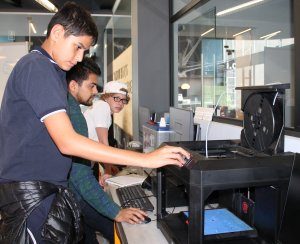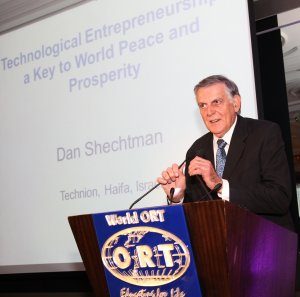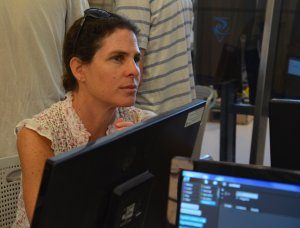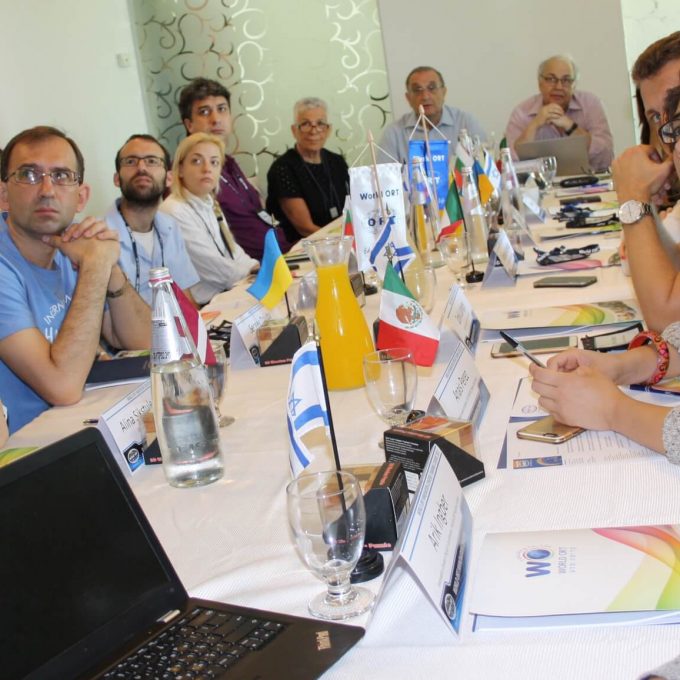Entrepreneurial skills are more important than ever – and World ORT hopes that a new pilot programme will take the teaching of such skills from the margins to the mainstream of its international school network.
Teachers from five ORT schools in Mexico and Europe have spent this week in Israel with colleagues from three of the country’s World ORT schools learning how to introduce teenagers to the world of technological innovation and entrepreneurship.
They have emerged giddy with the possibilities the 30-week curriculum offers their students and impatient to get started – even though the course is not scheduled to launch formally until the new academic year.
“I plan to start next week – I have so many ideas on how to use innovation technology in the labs to give stimulation and zeal to my kids,” said Zorik Lutinger, a teacher at Kfar Silver Youth Village. “This course will give them opportunities to build a start-up, to have a real future in a world that in 10 or 15 years will be much more competitive than it is now.”
He added: “Kids want to do something special with their lives. They don’t want to sit in front of Facebook all day. But it’s a question of daring; you have to dare to dream, to move with it and not be afraid of failure. So, this is a wonderful opportunity to give them a vision. They will be happy from the process, not only from the possible result.”
This week, Zorik and his colleagues experienced the course as their students will: they were asked to come up with ideas for things that could improve their lives, brainstorm them and shortlist them. They spent time at a Fab Lab, one of hundreds of small-scale workshops equipped with flexible computer-controlled tools enabling users to make almost anything. And they met staff at the multinational professional services network PricewaterhouseCoopers to see the importance of bringing in mentors from the business world.
“This was about engaging them rather than telling them what to do,” said the manager of the training course, World ORT Kadima Mada Pedagogical Coordinator Nechama Kenig. “This is how they’ll do it with their own students.”

Students doing the new course at CIM-ORT in Mexico City will have access to this 3D printer at the school’s new IDEA Lab.
The course that they will teach will be a blend of theoretical and practical activities designed to develop students’ knowledge, skills and understanding of topics such as business planning, marketing, prototyping, manufacturing and programming.
It will make the teenagers “innovation ready”, which should be the primary goal in modern education, according to Harvard education specialist Tony Wagner, author of Creating Innovators: The Making of Young People Who Will Change the World.
As he told New York Times columnist Thomas Friedman, with knowledge readily available at the touch of a button it is how you can use what you know that really counts.
“The capacity to innovate – the ability to solve problems creatively or bring new possibilities to life – and skills like critical thinking, communication and collaboration are far more important than academic knowledge,” he said, unwittingly listing the qualities which World ORT’s students will develop through this new course.
The skills acquired in initiatives such as World ORT’s pilot programme are not only useful for a budding Steve Jobs but also for those destined to be employees rather than employers.
This is not new to World ORT educators.
ORT Russia, for example, continues to use material from a partnership established with Hewlett Packard nearly a decade ago to provide high school seniors and young adults with training combining entrepreneurship education with practical hands-on experience in using IT to enhance their professional skills.
ORT Uruguay University’s Centro de Innovación y Emprendimientos (CIE) (Centre for Innovation and Entrepreneurship) has been launching about six sustainable companies a year, on average, since 2010.
And, when he was head of World ORT’s Academic Advisory Council, Nobel Prize laureate Professor Dan Shechtman argued that technological entrepreneurship (which he has been teaching at the Technion – Israel Institute of Technology for some 30 years) should be taught in high schools because it would help to create conditions for world peace.
But the pilot programme is a step towards the important goal of making such an approach mainstream.

Prof Dan Shechtman: Countries that develop technological entrepreneurship can maintain high living standards, lower population growth and so create conditions for world peace.
“Entrepreneurship education nurtures unconventional talents and skills. It helps children feel more confident, creates opportunity, stimulates the economy and can serve as an agent for social justice – all aspirations held dear by the ORT movement,” said World ORT Chief Program Officer Vladimir Dribinskiy. “Now we need funds in order to bring this course to more schools in 2018.”
Students taking part in World ORT’s pilot programme, which is being developed in partnership with the award-winning Israeli company Unistream, must use a Fab Lab, or something similar, in their city. Students at Colegio Israelita de Mexico (CIM-ORT) are fortunate to have one of their own – IDEA Lab, which incorporates a workshop, digital media centre, “ideas laboratory”, virtual library, and cultural spaces.
As CIM-ORT Board members Liora Zyman and Karen Bekman, the driving force behind the creation of the IDEA Lab, told the facility’s inauguration last year, “Our challenge is to prepare our students for jobs that do not yet exist, using technologies that have not yet been invented, to solve problems we have yet to face.”
Liora said this week’s training course had given her many more ideas on how to improve the way the school is using the lab. But above all it had contributed to her school’s push to modernise the way it educates at a time when Western education systems are often criticised for not adapting to a post-industrial economy.
“We have been stuck in old time education but now the kids need other skills. If we continue to operate in the way we did 20 years ago it won’t work for them. So, we’re trying to educate in a way that focuses on 21st century skills,” she said.

Liora Zyman: Education has to change if it is to give children what they need.
The end of this week’s training course does not leave the teachers high and dry: materials will be available through a World ORT Kadima Mada portal and a series of webinars has been planned. “If I have any questions I know where to come,” Liora said.
But there is no doubt that the teachers themselves feel that they have come a long way in just a few days and are excited by the journey ahead.
“This course has given me a lot of extra motivation,” Zorik said. “Combined with the fresh environment we have had at Kfar Silver since we joined the World ORT network, I think everything is just snowballing.”





